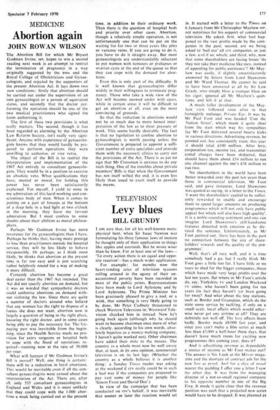MEDICINE
Abortion again
JOHN ROWAN WILSON
The Abortion Bill for which Mr Bryant Godman Irvine, MP, hopes to win a second reading next week is an attempt to restrict
the termination of pregnancy in a way originally suggested by the BMA and the
Royal. College of Obstetricians and Gynae- cologists, and rejected by the supporters of the present Abortion Act. It lays down two new conditions: firstly that abortion should
be carried out under the supervision of an NHS gynaecologist or a person of equivalent
status, and secondly that the doctor per- forming the operation should be one of the two medical practitioners who signed the form authorising it.
The first of these two provisions is what really matters. The second, though it has been regarded as alarming by the Abortion Law Reform Society, isn't really very signi- ficant. Anyone with experience of gynaecolo- gists knows that they would hardly be pre- pared to perform operations they were unwilling to authorise, or vice versa.
The object of the Bill is to restrict the interpretation and implementation of the 1967 Act entirely to consultant gynaecolo- gists. They would be in a position to exercise an absolute veto. What qualifications they have, mental or moral, for holding this power has never been satisfactorily explained. For myself, I yield to none in my admiration of this hard-working and con- scientious body of men. When it comes to putting on a pair of forceps at the bottom of a deep hole in a bad light at two o'clock in the morning, they have my fervent admiration. But I must confess to some doubts about their abilities as moral philoso- phers.
Perhaps Mr Godman Irvine has more reverence for the gynaecologists than I have.
Perhaps he thinks that, having more prestige to lose than practitioners outside the hospital service, they will be less likely to behave irresponsibly. Or perhaps, as I think most likely, he thinks that abortion at the present time is far too easy and is just searching rather helplessly round for a way of making it more difficult.
Certainly abortion has become a great deal easier than the 1967 Act intended. The Act did not specify abortion on demand, but it was so worded that sympathetic doctors could authorise abortions on demand with- out violating the law. Since there are quite a number of doctors around who believe that any woman has the right to dispose of a foetus she does not want, abortion now is largely a question of being in the right place, knowing the right doctor, and in some cases being able to pay the necessary fee. The fee- paying part was inevitable from the begin- ning, since the Health Service made no pro- vision for extra surgeons or hospital beds to cope with the flood of operations re- quired—running now at the rate of 50,000 per year.
What will happen if Mr Godman Irvine's Bill is passed? Well, one thing is certain: there will be a reduction in legal, abortions. This would be inevitable even if all the con- sultant gynaecologists were agreed about the interpretation of the Act. There are, after all, only 535 consultant gynaecologists in England and Wales and it is most unlikely that they could cope with the 1.000 abor- tions a week being carried out at the present time, in addition to their ordinary work. Then there is the question of hospital beds and priority over other cases. Abortion, though a relatively simple operation, is not unfortunately one that can be put on the waiting list for two or three years like piles or varicose veins. If you are going to do it, you have to do it straight away. But most gynaecologists are understandably reluctant to put women with tumours or prolapses or ovarian cysts at the end of the queue so that they can cope with the demand for abor- tions.
Even this is only part of the difficulty. It is well known that gynaecologists differ widely in their willingness to terminate preg- nancy. Those who take a wide view of the Act will become snowed under with cases. while in certain areas it will be difficult to get an abortion at all, even on the most convincing of grounds.
So that the reduction in abortions would not be so much due to more honest inter- pretation of the law as to sheer pressure of work. This seems hardly desirable. The fact is that no legislation to confine abortion to gynaecologists is worth passing unless the Government is prepared to appoint a suffi- cient number of extra specialists and provide them with the necessary clinics to carry out the provisions of the Act. There is as .yet no sign that Mr Crossman is anxious to do any such thing. One of the troubles about private members' Bills is that when the Government has not itself willed the end, it is even less likely than usual to exert itself to provide the means.


































 Previous page
Previous page